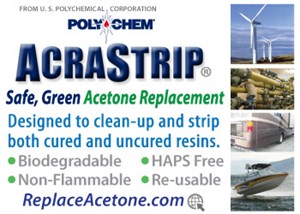Thermoset prepregs meet lightning strike protection specifications
CAMX 2024: A.P.C.M. highlights how its range of epoxy prepreg offerings undergo and surpass lighting strike testing.
Adhesive Prepregs for Composite Manufacturers (A.P.C.M., Plainsfield, Conn., U.S.) has been developing thermoset epoxy prepregs for the manufacturers, designers and hobbyists of composite parts since 1992. A.P.C.M. highlights how its standard epoxy prepreg systems and substrates are available for lightning strike testing review. To achieve this, the company develops the panels and sends them for testing by the Elements Testing Group (Pittsfield Mass., U.S.).
A.P.C.M. breaks down this process. To create the test panels, the company lays up 22 plies of material, the top ply being the lightning strike carbon fiber prepreg. Complete panels are 27" × 27" and 0.20-0.22 thousands thick. Debulking, curing and paint parameters are per Boeing specifications.
Panels testing shows two panels — differentiated by the thickness and the weight of the needle punched copper foil used to make the lightning strike prepreg — prior to and after strike tests. Testing is called zone 1 and zone 2, which equates to the power of the electricity used to strike the panel. One panel had a 0.029 Ib/2ft of copper and the other 0.040 Ib/2ft of copper. Each panel experienced surface damage but maintained their structural strength and protected against lightning strikes. which can result in the shorting out any of an aircraft’s electrical components.
At its booth, A.P.C.M. is showing a high-speed video of the test being performed, as well as all of its other standard thermoset epoxy prepreg products, from 180-375°F curing systems, including specialty woven and standard woven substrates from glass to carbon fiber to Kevlar. This includes hybrid carbon fiber/colored glass, carbon fiber/Kevlar, spread tow carbon, flax and hemp. Cured and uncured samples, as well as substrates are available for attendees to view.
Related Content
-
Noncontact optical strain gage delivers complete 3D surface measurement insight
CAMX 2025: The Aramis system by Trilion, based on DIC and photogrammetry technology, performs high-precision measurements in the sub-micrometer range, across a wide range of testing environments and material types.
-
Sheryl Connelly confirmed as keynote speaker for CAMX 2025
Connelly will bring her experience as a futurist and global consumer trends expert, equipping CAMX attendees with tools and strategies to navigate the global shifts in composites manufacturing.
-
VIDEO: Flexible molding and machining for composites
Addcomp and bespline are sister companies that offer innovative solutions for composites. This video from CAMX 2024 offers an overview of Addcomp’s AFP solutions.














